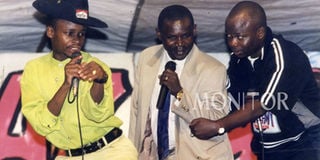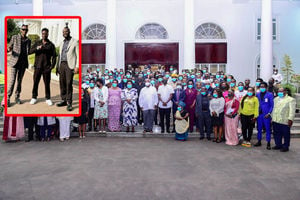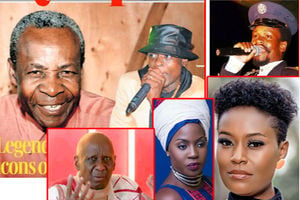
Despite producing several memorable songs, it is Walumbe Zzaaya that stands out most from Paul Kafeero (L). Photo | File
Nothing evokes nostalgia like the music that defined our past, childhood, and social lives. Ugandan music, woven into the country's social fabric, has reflected its journey since gaining independence. While the country's music industry has evolved tremendously, several iconic songs stand out-resonating through time and becoming a lasting part of Ugandan culture.
Although the roots of Ugandan modern music stretch back to the 1950s, Elly Wamala’s Nabutono is often considered the first commercially successful record. Over the decades, many hits have graced the airwaves, but a few songs have transcended their time. These tracks have influenced social narratives, contributed to the growth of the music industry, and are still cherished today.
Veteran musician Daniel Kazibwe, famously known as Ragga Dee, explains that while many songs are considered hits, only a select few achieve true timelessness. According to Andrew Jedidiah Ssebagala, Programmes Director at Uganda National Theatre, Uganda’s classical music may not fit the traditional western definition of the genre from the 1750–1820 era. However, the country's enduring music serves as the ‘classical’ of Ugandan society, marked by its cleaner sound, clearer divisions, and memorable melodies.
Elly Wamala’s Ani Yali Amanyi
Towards Uganda’s independence, musician Elly Wamala had found his footing with a number of songs, although his 1951 record, Nabutono, stood out.
Shockingly, with a number of albums and singles, the song that is synonymous with his name is Ani Yali Amanyi, which came way later in 2004 after he had been hospitalised due to cancer.
Ssebagala agrees that Wamala produced a lot of amazing music but Ani Yali Amanyi, which is also the title track of his album, will always stand out.
“Wamala was in hospital and rumour spread that he had passed on. He then shared his pain through a song that mirrors hope,” Ssebagala explains.
The song has been part of Ugandans for years to the fact that whereas Wamala has wedding songs such as Sacrament and others, Ani Yali Amanyi is a celebratory song at functions.
Brian Jerome Busuulwa, a music teacher, producer, singer and songwriter whose career was ignited this year with an album called Naaka, does not hesitate when asked where he draws his music inspiration. Elly Wamala is the quick answer.
Wamala’s music provides the bedrock for many vocal composition techniques and still features on DJs playlists. It is no wonder that rapper GNL Zamba made a rendition of Ani Yali Amanyi, which was successfully received by the younger generation.
The original voice of wedding music
The song Sooka Omunoonye has had its place at wedding functions for years.
Diplock Ssegawa, the voice behind the song shares that by 1985, the song had become part of his catalogue which he often sang at events.
“I first performed the song at a wedding organised at Buganda Road - Public libraries board on June 30, 1985 in a semi acoustic performance with then Kidayo choir pianist, a one Kasozi. Little did I know that the song would define my career,” he explains.

Diplock Ssegawa performing at an event. Photo | Courtesy | File
Much as Diplock was performing the song by 1985, the idea that was conceived in 1982 in Masaka was professionally recorded in 1987 at Andrew Crawford Studios, State House Road in Nairobi.
The song was later re-recorded at Nice Recording Studios in London in 1992, Lucky Studios, Sweden in 1997 and last recorded at Seven Sister Recording Studios, London in 2007.
Paul Kafeero’s ode to death
During his 37 years, Paul Kafeero recorded more than 20 albums, but it was his horrific hit Walumbe Zzaaya that got him immortalised. The 1994 masterpiece was an attack, lamentation and effort to give death a human face.
In Walumbe Zzaaya (death, the destroyer), Kafeero deals with the dreaded subject in a lengthy yet conversational manner, using a richness in words to portray the sadness.
According to the book, One Little Guitar: The Words of Paul Job Kafeero by Kathryn Barrett-Gaines, aka Omwana W’Omuzungu, it was for this song that Kafeero was christened the Golden Boy of Africa, after winning the gold medal from the Institute d’Etudes Theatreales at the Cairo Music Festival of 1994.
Arts Journalist Moses Sserugo shares that the song tackles default statements about death using his signature country kind of music.
Bus Duniya, the prophecy of Herman Basudde
Ragga-Dee says singer Herman Basudde literally sang about most social issues in Ugandan society to the fact that those that were never popular before his death, keep occurring.
He mentions that this makes many people continue referring to him as a prophet. He, however, emphasises that the title ’prophet’ hails more from his famous song Bus Dunia.
Besides the delectable sound of the guitar in the song, Herman Basudde used the intro of the song not just to celebrate himself, but to literally mirror the current political situation in Uganda and Africa.
Basudde had an amazing career with a number of songs that speak to people differently, but Bus Dunia still shines.
Wipolo, the song that won us a Kora
It was all glory in December 2003 when Gospel singer, Pastor George Okudi, beat a number of continental and global stars to the sought-after Kora award in the Best of Africa Male Artiste award in South Africa with his song Wipolo.
The prestigious Kora announced Okudi’s name in the book of Uganda’s history to the fact that his song Wipolo went further to become a Church hymn that is prized by the Pentecostal community in Uganda and beyond.
Kimuli kya Rosa and the love stories
Ssebagala suggests that a love song should always be simple and understandable and when asked to mention any, “Kimuli kya Rosa”, he answers.
He adds that Kimuli Kya Rosa, a love ballad of the 1990s by the late Fred Maiso is a song that propels the audience to connect with the emotions as they rhyme to the lyrics.
He shares that for years, Kimuli kya Rosa is one the few local loves songs that can replace western music for the first dance at weddings.

Chameleone (L), Bebe Cool (R) and Pastor Okudi in South Africa where he had won a Kora Award for Wipolo. Photo | Courtesy | File
Close to Kimuli Kya Rosa, the song Tindatine by Lady Mariam proved itself as a wedding anthem in western Uganda and the central.
Presumably the first Runyankole modern recording to rule Uganda’s airwaves, the song won a PAM Award for western artiste of the year 2007.
Another love anthem is Jim, a song by Joanita Kawalya. Jim is supposedly the most played song by most cover bands besides Afrigo Band.
Singing for the women
Besides writing a number of love songs, Sylver Kyagulanyi’s Ekyasa Kyabakyala, a song released during his senior six vacations in 1999, proves to be a landmark in female emancipation and it actually pushed him further up the music ladder.
The year Enders
The mood is always festive in Uganda during the last two months of the year as people gear up for Christmas and the New Year.
“Gloooooo, Gloria Gloooooo Glory be to Jesus Christ Was born on Christmas day,” proves to be among the most famous end of year lyrics from Philly Lutaaya’s song Gloria.
However it is easy to suggest that his Tumusinze album released in December 1989 has been the most popular music product in Uganda, enjoying airplay both in homes, streets and mainstream broadcast media.
With Lutaaya’s songs proving to be monumental for every festive season alongside Bonney M, Celine Dion, George Michael, among others, many Ugandan musicians have lived up to the groove with a couple of songs that celebrate the festive season.
Other songs include Hadijah Namale’s Mukulike Omwaaka, a song that celebrates the New Year and recount what people went through in the past year.
In 1973, Namale released Mukulike Omwaka, a song that will live with us for centuries and it might be the most popular New Year song. Surprisingly, Mukulike Omwaka is reportedly a direct translation of the song she had composed in Lingala while still in Bunia- DR Congo, in 1963, where she worked as a house help for a Congolese family.
Parte after Parte, the shocker
It is irresponsible to allege that singer Big Trill is a big star but his song Parte After Parte proves to be the swiftest musical breakthrough of our time.
Besides getting a mention by American stars Cardie B and Offset, singer Wiz Kid called it the African anthem and later English premier league side Arsenal FC used it in the unveiling of player Thomas Party.
The Big Three
Jose Chameleone, Bobi Wine and Bebe Cool have always been referred to as Uganda’s musical big three, given their contribution to the music industry.
With many songs recorded to their names, songs Mama Mia, Love You Everyday and Tata Wabana are songs that will surely live with us.
It is understood that Chameleon’s Mama Mia introduced him to Uganda’s music industry in 1999 and the song literally sold across East Africa.
Several analysts share that Maama Mbiire, which came after Taata Wabana, collaborations with singer Juliana Kanyomozi helped Bobi Wine announce himself in all music markets and eventually he started getting corporate deals.




